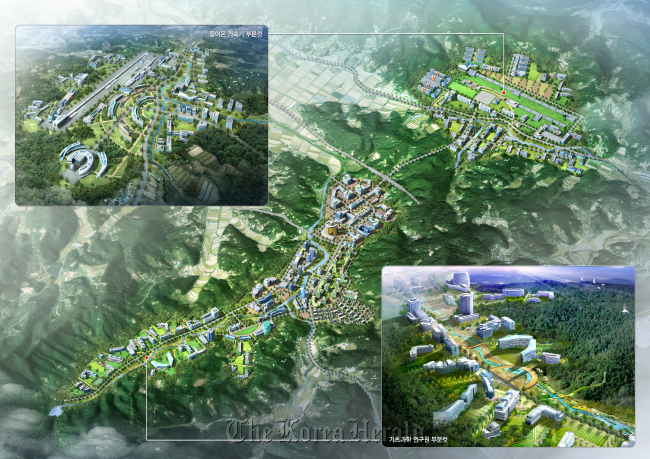President-elect Park Geun-hye is looking to enhance the country’s science and technology competitiveness with the establishment of a powerful new ministry that will oversee research and development policies and industrialization of innovations.
But it seems Park is already facing a major obstacle with the delay of a project to build a mega science and business complex that promised to house world-class basic science research organizations and related business facilities.
The government is planning to complete the International Science and Business Belt by 2017 in a 3.6-square-kilometer area of Daejeon. To make the mega project more prosperous, the government is also planning to bring in some 500 foreign experts by the end of 2017.
 |
A scale drawing of the proposed International Science and Business Belt that includes the Institute for Basic Science and Korea Rare Isotope Accelerator. The development is due to be completed by 2017 on a 3.6 square-kilometer area in Daejeon. (ISBB) |
The plan, however, faces an uncertain future due to political wrangling among the central and local governments and ruling and opposition parties. The National Assembly failed to allocate the budget for the project as the central government and Daejeon city differed over how to share the expenditures.
The government pledged to invest a total of $4.9 billion into the complex, calling on the Daejeon Metropolitan Government to pay its half of the bill. But the city refused the demand, claiming it was a national-level project.
Building the multi-billion-dollar science belt is crucial for nurturing homegrown scientists and technologies as well as creating more jobs, according to the government.
The science belt is also in tandem with the incoming president’s policies to promote fundamental science and build a creative economy. Park, an engineering graduate, has vowed to forge new drivers of economic growth through science and technology.
But so far, the project has yet to outline specific objectives, other than the aspirations of its mission statement. Officials and the local science community, in particular, are growing increasingly concerned at the repercussions the delay is likely to cause.
“Applied science is a matter of market share, but in basic science everything goes to the team that makes the discovery first. We fear that this delay in research may lead to a loss in national growth,” an official from the International Science and Business Belt said.
A year’s delay can hold back research plans for many years and throw Korea further behind in the global competition, observers say.
For example, the ISBB is to host sophisticated equipment such as a rare isotope accelerator, an advanced facility designed to produce and explore new types of atom that will help nuclear physics and materials science.
Presently, Korea’s private and public investments are focused on research and development in applied science which yields immediate returns.
Korea has grown its industries through revert engineering and borrowed the innovative technologies of other countries. However, its catch-up development model is beginning to reach a limit in growth potential due to a lack of original technology ― Korea’s technology trade deficit grew from 2.08 billion won ($1.9 million) in 2002 to 4.86 billion won in 2009, according to OECD data.
Local residents are also dismayed to hear of the delay of the multi-billion science and business belt.
“This has gone on long enough,” Kum Hong-seop, an official of civic group called Daejeon People’s Solidarity for Participatory Democracy and Self Government told The Korea Herald.
“President Lee Myung-bak had pledged to construct the belt in Chungcheong. Later in his term, he changed his mind and the site for the belt was up for grabs, which led to intense competition and friction between provinces to host the belt,” he added.
He also pointed out that President-elect Park had promised to initiate government investment in the project in November during her election campaign in the Chungcheong area.
“The ISBB is the only pledge she made for the Chungcheong provinces. The entire region will be devastated if she reneges on the single promise she made to us. This will strike a critical blow against support for the president-elect and her party in this region,” he said.
By Oh Kyu-wook and Lee Sang-ju
(
596story@heraldcorp.com) (sjlee370@heraldcorp.com)



![[Herald Interview] 'Korea, don't repeat Hong Kong's mistakes on foreign caregivers'](http://res.heraldm.com/phpwas/restmb_idxmake.php?idx=644&simg=/content/image/2024/11/13/20241113050481_0.jpg)
![[KH Explains] Why Yoon golfing is so controversial](http://res.heraldm.com/phpwas/restmb_idxmake.php?idx=644&simg=/content/image/2024/11/13/20241113050608_0.jpg)



